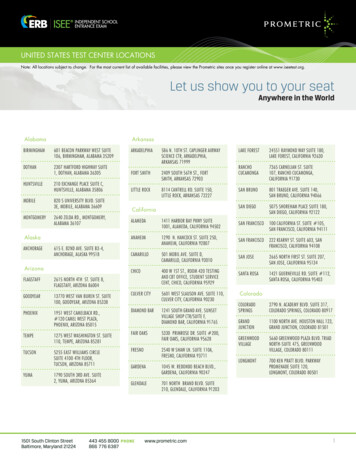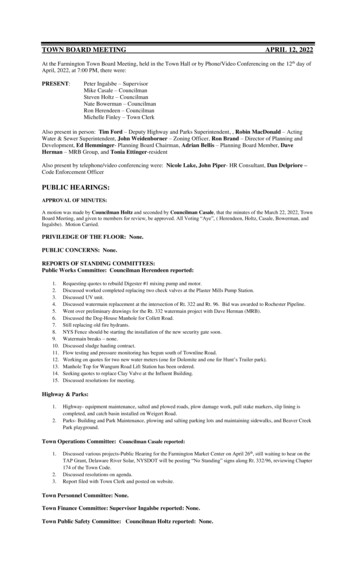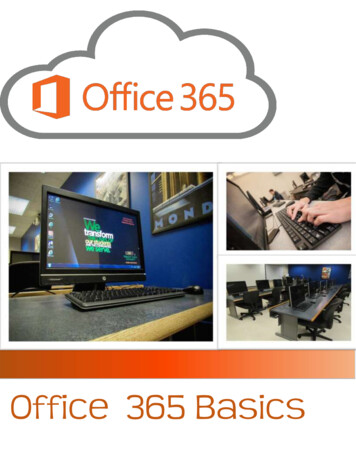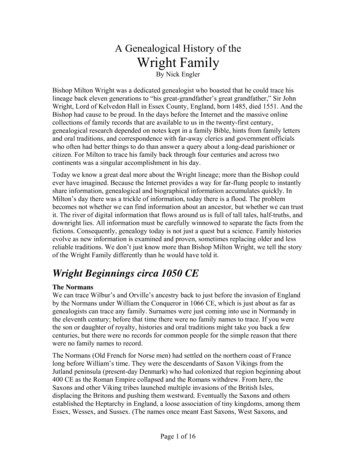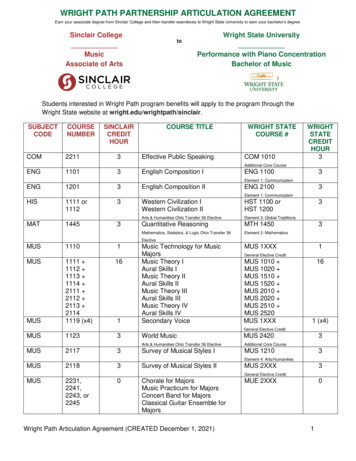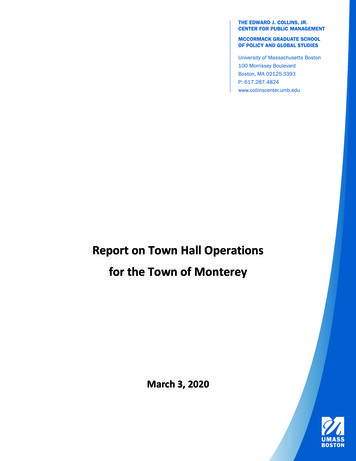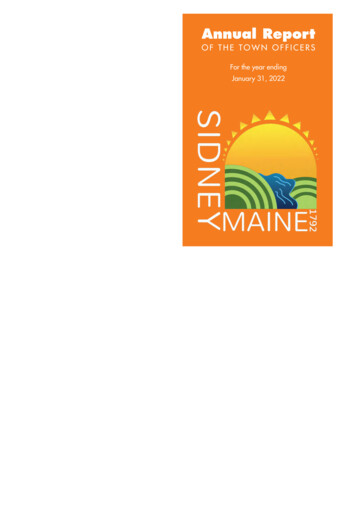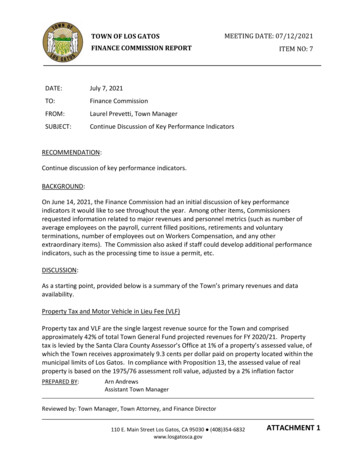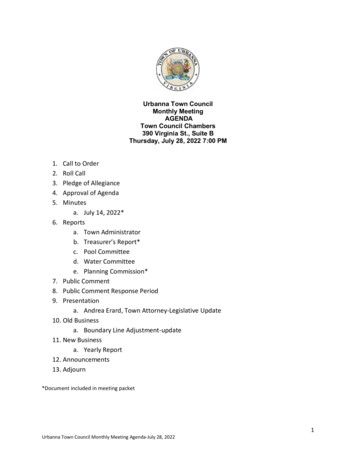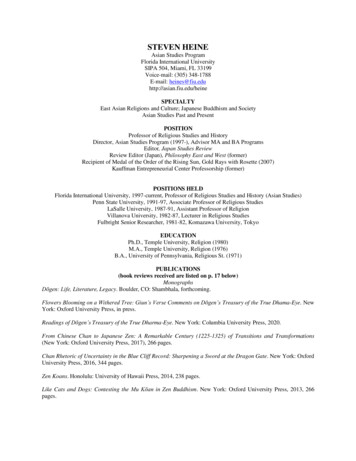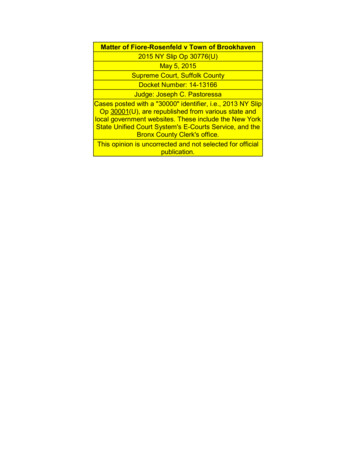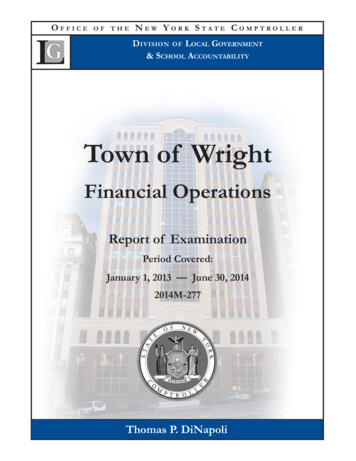
Transcription
Officeof theN e w Y o r k S t a t e C o m p t r o ll e rD ivision of Local Government& School AccountabilityTown of WrightFinancial OperationsReport of ExaminationPeriod Covered:January 1, 2013 — June 30, 20142014M-277Thomas P. DiNapoli
Table of ContentsPageAUTHORITY LETTER1EXECUTIVE SUMMARY2INTRODUCTIONBackgroundObjectivesScope and MethodologyComments of Local Officials and Corrective Action44445FUND BALANCERecommendation68PURCHASING AND ENDIXAPPENDIX12141516ABCDResponse From Local OfficialsAudit Methodology and StandardsHow to Obtain Additional Copies of the ReportLocal Regional Office Listing
State of New YorkOffice of the State ComptrollerDivision of Local Governmentand School AccountabilityApril 2015Dear Town Officials:A top priority of the Office of the State Comptroller is to help local government officials managegovernment resources efficiently and effectively and, by so doing, provide accountability for taxdollars spent to support government operations. The Comptroller oversees the fiscal affairs of localgovernments statewide, as well as compliance with relevant statutes and observance of good businesspractices. This fiscal oversight is accomplished, in part, through our audits, which identify opportunitiesfor improving operations and Town Board governance. Audits also can identify strategies to reducecosts and to strengthen controls intended to safeguard local government assets.Following is a report of our audit of the Town of Wright, entitled Financial Operations. This auditwas conducted pursuant to Article V, Section 1 of the State Constitution and the State Comptroller’sauthority as set forth in Article 3 of the New York State General Municipal Law.This audit’s results and recommendations are resources for local government officials to use ineffectively managing operations and in meeting the expectations of their constituents. If you havequestions about this report, please feel free to contact the local regional office for your county, as listedat the end of this report.Respectfully submitted,Office of the State ComptrollerDivision of Local Governmentand School AccountabilityDivision of Local Government and School Accountability11
State of New YorkOffice of the State ComptrollerEXECUTIVE SUMMARYThe Town of Wright (Town) is located in Schoharie County and provides various services for itsresidents, including street maintenance, refuse management and general government support. TheTown’s 2014 general fund budget of 300,000 is funded primarily by real property taxes, paymentsin lieu of taxes and sales tax. During the scope period, total non-payroll expenditures in the generaland highway funds were 1,432,229. The Town is governed by an elected Town Board (Board) whichcomprises the Town Supervisor (Supervisor) and four Board members. The Supervisor, as chieffiscal officer, is responsible for the day-to-day management of the Town. The Supervisor has hired abookkeeper to perform accounting functions and to maintain accounting records. The prior Supervisorwas in office until February 2013. The Deputy Supervisor assumed the duties of Supervisor until beingvoted into office in November 2013.Scope and ObjectivesThe objectives of our audit were to review the Town’s budget planning and financial management forthe period January 1, 2013 through June 30, 2014. We extended our review back to January 1, 2011to analyze budget planning and forward to the 2015 budget to assess its reasonableness. Our auditaddressed the following related questions: Did the Board properly manage the Town’s general fund balance? Did the Board ensure that all purchases were at the best price and all disbursements were forproper Town purposes?Audit ResultsThe Town Board did not properly manage the Town’s general fund balance from 2011 through 2014.For those years, the Board adopted unrealistic budgets that were essentially the same budgets year afteryear. As a result, the Board accumulated general fund balance while raising taxes. However, beginningwith the 2015 budget, the Board plans to reduce the general fund balance to benefit taxpayers. To doso, it is cutting the general fund tax levy by 90 percent and appropriating 187,000 of fund balance.However, the general fund tax levy reduction coincides with an increase in the highway fund tax levyof over 30 percent, or 121,942. If the Board does not create realistic budgets, there is an increasedrisk that moneys will not be used to benefit taxpayers.The Board did not ensure that purchases were at the best price and all disbursements were for properTown purposes. There was no evidence that quotes were obtained from more than one party for foreseen2Office of the New York State Comptroller
purchases of less than 2,500, or that pre-approval from the Board was obtained for purchases over 2,500, as required by Board resolution. In addition, no one verified that checks were for properTown purposes or independently reviewed bank reconciliations. Further, the Board did not performan annual audit of the Supervisor’s books and records. We tested for compliance with competitivebidding requirements and business interests of Town officials, scanned check disbursements totaling 2,604,057 and scanned non-check disbursements totaling 2,031. Although we found no materialexceptions, there is an increased risk that goods and services will not be obtained at a competitive priceor that the bookkeeper, who has custody of the check stock, could disburse funds without the Board’sknowledge.Comments of Local OfficialsThe results of our audit and recommendations have been discussed with Town officials, and theircomments, which appear in Appendix A, have been considered in preparing this report. Town officialsgenerally agreed with our recommendations and indicated they planned to initiate corrective action.Division of Local Government and School Accountability33
IntroductionBackgroundThe Town of Wright (Town) is located in Schoharie County, has apopulation of approximately 1,540 as of the 2010 census, and coversan area of 29 square miles. The Town provides various services forits residents, including street maintenance, refuse management andgeneral government support. The Town’s 2014 general fund budgetof 300,000 is funded primarily by real property taxes, payments inlieu of taxes and sales tax. During the scope period, total non-payrollexpenditures in the general and highway funds were 1,432,229.1The Town is governed by an elected Town Board (Board) whichcomprises the Town Supervisor (Supervisor) and four Board members.The Board is responsible for overseeing the Town’s operations andfinances. The Supervisor, as chief fiscal officer, is responsible for theday-to-day management of the Town, including performing basicaccounting functions and maintaining accounting records, underthe direction of the Board. The Supervisor has hired a bookkeeperto perform accounting functions and to maintain accounting records.The prior Supervisor was in office at the beginning of our scope perioduntil February 2013. The Deputy Supervisor assumed the duties ofSupervisor until being voted into office in November 2013.The objectives of our audit were to review the Town’s budget planningand financial management. Our audit addressed the following relatedquestions:ObjectivesScope andMethodology Did the Board properly manage the Town’s general fundbalance? Did the Board ensure that all purchases were at the best priceand all disbursements were for proper Town purposes?We examined the Town’s fund balance, purchasing and disbursementsfor the period January 1, 2013 through June 30, 2014. We extendedour review back to January 1, 2011 to analyze budget planning andforward to the 2015 budget to assess its reasonableness.We conducted our audit in accordance with generally acceptedgovernment auditing standards (GAGAS). More information onsuch standards and the methodology used in performing this audit isincluded in Appendix B of this report.14These expenses include purchases of a capital nature, and materials and suppliesfor various Town purposes.Office of the New York State Comptroller
Comments ofLocal Officials andCorrective ActionThe results of our audit and recommendations have been discussedwith Town officials, and their comments, which appear in AppendixA, have been considered in preparing this report. Town officialsgenerally agreed with our recommendations and indicated theyplanned to initiate corrective action.The Board has the responsibility to initiate corrective action. Awritten corrective action plan (CAP) that addresses the findings andrecommendations in this report should be prepared and forwardedto our office within 90 days, pursuant to Section 35 of the GeneralMunicipal Law. For more information on preparing and filing yourCAP, please refer to our brochure, Responding to an OSC AuditReport, which you received with the draft audit report. We encouragethe Board to make this plan available for public review in the Clerk’soffice.Division of Local Government and School Accountability55
Fund BalanceThe Board is responsible for making sound financial decisions thatbalance the level of services desired and expected by the Town’sresidents with the ability and willingness of the residents to pay forsuch services. The Board should adopt budgets that include realisticestimates of revenues and expenditures and that use surplus fundbalance as a funding source, when appropriate. The Board may retaina reasonable portion of unexpended surplus funds to be available inthe event of unforeseen circumstances. The Board may also establishand place moneys into reserve funds to finance the future costs of avariety of items or purposes.Beginning with the 2015 budget, the Board has reduced the generalfund tax levy and appropriated unassigned fund balance to use theaccumulated general fund balance to benefit taxpayers. However,from 2011 through 2014, the Board did not properly manage theTown’s general fund balance when it accumulated general fundbalance while raising taxes. At the end of the 2011 fiscal year,unassigned general fund balance was 348,482, or 120 percent of thenext year’s appropriations, which is excessive. After the followingtwo fiscal years, the general fund unassigned fund balance grew to 381,552 or 127 percent of the next year’s appropriations. While theTown has set aside 83,000 in informal reserves, this money is notlegally restricted and therefore is available for appropriation and isincluded in the unassigned fund balance figures above.The accumulation of fund balance prior to 2015 occurred becausethe Board members did not adopt realistic budgets. Under the priorSupervisor (until February 2013), the budget process was guidedlargely by the Supervisor. Although budget workshops were held,the input from other Board members and from department heads wassubordinated to the prior Supervisor’s plan. The prior Supervisor’sbudgets did not consider prior years’ actual results or current andfuture known needs and were essentially the same budgets year afteryear.Prior to the 2015 fiscal year, the Town’s last four budgets generated 326,458 in budgetary surpluses,2 as follows:26A budgetary surplus occurs when revenues are underestimated and/or expendituresare overestimated.Office of the New York State Comptroller
Figure 1: General Fund Budget VariancesFiscal YearEnd 2011Fiscal YearEnd 2012Fiscal YearEnd 2013Projected FiscalYear End 2014Budgeted Revenues 229,762 226,333 233,199 234,230 923,524 230,881Actual Revenues 259,588 251,896 264,798 237,980 1,014,262 253,565 29,826 25,563 31,599 3,750 90,738 22,684Budgeted Appropriations 290,202 291,333 297,199 299,301 1,178,035 294,509Actual Expenditures 218,881 230,888 252,665 239,881 942,315 235,579 71,321 60,445 44,534 59,420 235,720 58,930 101,147 86,008 76,133 63,170 326,458 81,614Underestimated RevenuesOverestimated ExpendituresTotal Budget VarianceTotalAverageIn prior years, the Board members tried to offset the real property taxlevies by appropriating fund balance in the budgets, but the Boarddid not achieve this due to unrealistic budgets. Although the Boardmembers appropriated an average of 63,000 per year in fund balance,the fund balance was not used because of the budget variances thataveraged 81,614 per year as shown in Figure 1 above. The use offund balance as a budgetary funding source only occurs when thefund experiences an operating deficit.Under the current Supervisor, the process has become more receptiveto department head input. However, the first budget created by thecurrent Supervisor for 2014 did not change significantly from theprior year because the current Supervisor was not willing to makesignificant changes before becoming more familiar with the budgetingprocess and the Town’s needs. In 2015, the Board is taking steps toreduce the excessive fund balance in the general fund by cutting thegeneral fund tax levy by almost 90 percent from 124,072 in 2014to 12,753 in 2015 and appropriating 187,0003 of unassigned fundbalance. Combined with the projected deficit in 2014, this shouldreduce general fund balance in 2015 if the budgetary appropriations for2015 are realistic and an operating deficit occurs in 2015.4 However,the general fund tax levy reduction coincides with an increase inthe highway fund tax levy of over 30 percent, or 121,942. If theBoard does not create realistic budgets, there is an increased risk thattax levies will be higher than necessary or that moneys will not beavailable to provide intended services.34This is an increase of 122,000 over the previous year’s appropriated generalfund balance, while the general fund tax levy decreased by 111,319.The 2015 budget has not changed significantly from the 2014 budget in terms ofappropriations and non-property tax revenues, and the budget may therefore stillnot be realistic for those accounts.Division of Local Government and School Accountability77
RecommendationThe Board should:1. Adopt realistic budgets based on prior years’ actual results andcurrent and future known needs.8Office of the New York State Comptroller
Purchasing and DisbursementsThe Board is responsible for adopting policies that describe itsgoals for procurements, including formal procurement policies andprocedures5 that govern the acquisition of goods and services notrequired by law to be competitively bid.6 The Board, during its requiredaudit of claims against the Town, is responsible for ensuring thatclaims contain evidence of compliance with established procurementguidelines. This control helps ensure that the Town obtains qualitycommodities and services at the lowest possible cost. The Supervisor,as chief fiscal officer, is primarily responsible for establishing controlsover cash disbursements. Included in such a control system is theproper segregation of duties to ensure that no one person controls allphases of a transaction and providing for the work of one employeeto be verified by another employee in the course of his or her duties.If it is not feasible to segregate duties, Town officials must institutecompensating controls, such as enhanced management oversight. TheBoard also has certain powers and duties with respect to overseeingthe financial affairs of the Town, including a requirement to audit therecords and reports of the Supervisor at least annually.Purchasing Policy – The Board has not adopted a formal procurementpolicy. Alternatively, the Board has passed a resolution requiring theHighway Superintendent to obtain quotes from more than one partyfor foreseen purchases of less than 2,500 and to obtain pre-approvalfrom the Board for all purchases over 2,500 using an expenseauthorization form. We found no evidence that quotes were obtainedduring the scope period7 and no evidence that expenditures over 2,500were pre-approved by the Board using the expense authorizationform. The Board has not adopted a purchasing policy or proceduresfor all purchases because it believed that the highway purchasingprocedures were sufficient and merely relied on the Supervisor andHighway Superintendent to make purchases at the best price. Absent amore complete policy, questions will arise regarding the requirementsfor price competition and necessary support for purchases made byTown employees.567In some cases, the initial policies and updates will be drafted by procurementofficials for the Board’s review and eventual approval.In general, the General Municipal Law (GML) requires purchases of goodsover 20,000 and purchases of services over 35,000 to be competitively bid.There are some exceptions, such as making a purchase through State or Countycontracts, or making an emergency purchase.The Highway Superintendent provided evidence that he was currently retainingdocumentation that quotes were obtained.Division of Local Government and School Accountability99
Claims Audit – The Board members audited and approved all claimspresented to them. However, the Board approved claims totaling 430,211 for highway-related goods and services without any evidencethe purchases were in compliance with their adopted procurementresolution. The Highway Superintendent told us that documentationof quotes obtained during the scope period was disposed of. Withoutensuring adherence to Board-adopted procedures already in place,there is no assurance that Town officials are obtaining goods andservices at a competitive price.Disbursements – While the Board audits each bill, it does not verifythat the checks that cleared the bank are for proper Town purposes, asno one reviews canceled check images or bank transfers. The Boardalso does not verify whether purchases over 2,500 have expenseauthorization forms, in accordance with its resolution. Further, noone independently reviews the bank reconciliations nor does theBoard perform an annual audit of the Supervisor’s books and records.Therefore, the bookkeeper, who has custody of the check stock, coulddisburse funds without the Board’s knowledge.The above deficiencies occurred because the Supervisor and Boardwere unaware that they were required to perform certain duties. Forexample, the Supervisor was not aware she should review canceledcheck images and compare canceled check images to approvedabstracts, and the Board was not aware it should perform an annualaudit of the Supervisor’s books and records or that it was required torequest expense authorization forms. As a result of these deficiencies,we tested purchases in the amount of 20,000 or more to determineif they complied with competitive bidding requirements and verifiedthat Town officials did not have any employment or business interestswith Town vendors. We also scanned all 1,342 audit period checkdisbursements, totaling 2,604,057, to verify that the checks weresigned by the Supervisor. Further, we traced 12 check disbursementstotaling 5,348 to supporting documentation to verify that they werefor Town purposes and verified that all 216 non-check disbursements,8totaling 2,031,711, were to the Town’s other bank accounts, to theInternal Revenue Service or for bank fees.While we found no material exceptions, there is a risk that thebookkeeper could disburse funds for inappropriate purposes withoutBoard knowledge.810Non-check disbursements include transfers of moneys from one Town bankaccount to another, electronic payments of payroll taxes to the IRS and electronicpayments of bank fees for purchases of check stock.Office of the New York State Comptroller
RecommendationsThe Board should:2. Adopt a formal procurement policy and monitor compliance.3. Perform an annual audit of the Supervisor’s books and records.The Supervisor should:4. Implement compensating controls, such as reviewingcanceled check images and comparing canceled check imagesto approved abstracts.Division of Local Government and School Accountability1111
APPENDIX ARESPONSE FROM LOCAL OFFICIALSThe local officials’ response to this audit can be found on the following page.12Office of the New York State Comptroller
STATE OF NEW YORKTOWN OF WRIGHTP.O. BOX 130GALLUPVILLE, NY 12073TELEPHONE (518) 872-9726FAX (518) 872-2137March 2015Dear Auditors of New York State:First off let me say thank you for the courtesy and professionalism you showed during the town auditing process. I enjoyed theopportunity to work closely with your department. I would like to take this time to make the following comments based on the resultsof our recent audit:As the town supervisor I feel that we maintained a healthy fund balance. With this balance we were able to fund our Murphy roadFEMA project. By doing this we save the town interest on a million dollar reconstruction. We did not receive the reimbursementmoney from FEMA in time for the 2015 budget, therefore the highway fund was needed to subsidize the 2015 budget instead of thegeneral fund. This created the 90/30 percent tax levy between the two funds (general/highway).During the auditing process I had the opportunity to speak in person about the variances in our budget between the years of 2011-13.As a result of catastrophic flood damage, sales on goods throughout the county for rebuilding projects generated larger sales taxrevenue. This resulted in higher ending revenue than originally estimated. The 2011 flood gave us the opportunity to utilize FEMAmoney instead of our highway appropriations. The town was able to leverage our own employees to complete many smaller projectsleading to an end result of over- estimated expenditures.The town audit has brought to light some points of interest that we have acted on and will continue to improve on moving forward.Prior to meeting with you, our fund balance did not contain capital reserves. Since then, the board has created three capital reservefunds; building, highway equipment, and recreational. As supervisor I am working with the county on rewriting their policies andprocedures and will work to utilize those changes in developing our town’s procurement policy. The board is currently auditing thesupervisor’s books monthly to make them more accurate for the annual audit. In response to reviewing cancelled check images, I nowinitial all images prior to the Board reviewing them(as part of the supervisors audit) before delivering to the town accountant.My goal as both Supervisor and taxpayer is to keep a fair and efficient budget under the 2% tax cap, while still providing as manyservices as possible. I believe strongly in maintaining a consistent budget that provides taxpayers the courtesy of knowing what toexpect year after year. With the recommendations from the Comptroller’s office I am excited to see the Town of Wright continue on aproductive path.Sincerely,Amber L. Bleau, Town of Wright SupervisorTown Supervisor-Amber Bleau * Highway Superintendent-Jeff Proper * Town Clerk-Lynn HerzogTown Councilmembers: Thomas Aulita, George Karlewicz, Alex Luniewski & Ed ThorntonSole Assessor-Susan Frazier * Code Enforcement Officer-Lloyd StannardDivision of Local Government and School Accountability1313
APPENDIX BAUDIT METHODOLOGY AND STANDARDSTo accomplish our objectives, we interviewed appropriate Town officials and employees, testedselected records and examined pertinent documents for the period January 1, 2013 through June 30,2014. We expanded our review back to 2011 to analyze budget planning. Our examination includedthe following: We interviewed Town officials and employees and reviewed monthly reports to the Board andBoard minutes of monthly meetings to gain an understanding of Town operations. We compared adopted budgets for 2011, 2012 and 2013 to the corresponding years’ annualupdate documents (AUD) data for all line items and calculated the percentage and dollarvariances between the AUDs and the budgets. For each percentage variance of more than 10percent with a dollar variance over 100, we asked the Supervisor and bookkeeper about thecause of the variance. We compared the 2012, 2013 and 2014 adopted budgets with the adopted budgets and AUDsfrom the prior years (2011, 2012 and 2013) for all line items. We calculated the dollar variancesof the budgets from the prior years’ budgets and AUDs. We compared the two variances anddetermined whether the adopted budgets were closer to the prior year’s budgets or prior years’actual revenues or expenditures. We reviewed the 2015 adopted budget and compared it to the 2014 adopted budget and 2014projected revenues and expenditures to assess the reasonableness of the budget. We identified all checks that cleared the bank in the amount of 20,000 or more and testedwhether the purchases were bid out if subject to GML or whether they were on State orCounty contract, through a preferred source, were emergency purchases, were for insurance orotherwise were subject to GML. We created a list of all vendors the Town paid and tested whether Town officials responsiblefor purchasing decisions had any employment or business interests in those vendors. We reviewed all check disbursements and all non-check disbursements to determine whetherdisbursements were made for Town purposes. We located all 26 items bought in two large high-risk purchases totaling 2,450 on Townpremises and obtained evidence that the purchased items were for Town purposes.We conducted this performance audit in accordance with GAGAS. Those standards require that weplan and perform the audit to obtain sufficient, appropriate evidence to provide a reasonable basis forour findings and conclusions based on our audit objectives. We believe that the evidence obtainedprovides a reasonable basis for our findings and conclusions based on our audit objectives.14Office of the New York State Comptroller
APPENDIX CHOW TO OBTAIN ADDITIONAL COPIES OF THE REPORTTo obtain copies of this report, write or visit our web page:Office of the State ComptrollerPublic Information Office110 State Street, 15th FloorAlbany, New York 12236(518) on of Local Government and School Accountability1515
APPENDIX DOFFICE OF THE STATE COMPTROLLERDIVISION OF LOCAL GOVERNMENTAND SCHOOL ACCOUNTABILITYAndrew A. SanFilippo, Executive Deputy ComptrollerGabriel F. Deyo, Deputy ComptrollerNathaalie N. Carey, Assistant ComptrollerLOCAL REGIONAL OFFICE LISTINGBINGHAMTON REGIONAL OFFICEH. Todd Eames, Chief ExaminerOffice of the State ComptrollerState Office Building - Suite 170244 Hawley StreetBinghamton, New York 13901-4417(607) 721-8306 Fax (607) 721-8313Email: Muni-Binghamton@osc.state.ny.usServing: Broome, Chenango, Cortland, Delaware,Otsego, Schoharie, Sullivan, Tioga, Tompkins CountiesNEWBURGH REGIONAL OFFICETenneh Blamah, Chief ExaminerOffice of the State Comptroller33 Airport Center Drive, Suite 103New Windsor, New York 12553-4725(845) 567-0858 Fax (845) 567-0080Email: Muni-Newburgh@osc.state.ny.usServing: Columbia, Dutchess, Greene, Orange,Putnam, Rockland, Ulster, Westchester CountiesBUFFALO REGIONAL OFFICEJeffrey D. Mazula, Chief ExaminerOffice of the State Comptroller295 Main Street, Suite 1032Buffalo, New York 14203-2510(716) 847-3647 Fax (716) 847-3643Email: Muni-Buffalo@osc.state.ny.usROCHESTER REGIONAL OFFICEEdward V. Grant, Jr., Chief ExaminerOffice of the State ComptrollerThe Powers Building16 West Main Street – Suite 522Rochester, New York 14614-1608(585) 454-2460 Fax (585) 454-3545Email: Muni-Rochester@osc.state.ny.usServing: Allegany, Cattaraugus, Chautauqua, Erie,Genesee, Niagara, Orleans, Wyoming CountiesServing: Cayuga, Chemung, Livingston, Monroe,Ontario, Schuyler, Seneca, Steuben, Wayne, Yates CountiesGLENS FALLS REGIONAL OFFICEJeffrey P. Leonard, Chief ExaminerOffice of the State ComptrollerOne Broad Street PlazaGlens Falls, New York 12801-4396(518) 793-0057 Fax (518) 793-5797Email: Muni-GlensFalls@osc.state.ny.usSYRACUSE REGIONAL OFFICERebecca Wilcox, Chief ExaminerOffice of the State ComptrollerState Office Building, Room 409333 E. Washington StreetSyracuse, New York 13202-1428(315) 428-4192 Fax (315) 426-2119Email: Muni-Syracuse@osc.state.ny.usServing: Albany, Clinton, Essex, Franklin,Fulton, Hamilton, Montgomery, Rensselaer,Saratoga, Schenectady, Warren, Washington CountiesHAUPPAUGE REGIONAL OFFICEIra McCracken, Chief ExaminerOffice of the State ComptrollerNYS Office Building, Room 3A10250 Veterans Memorial HighwayHauppauge, New York 11788-5533(631) 952-6534 Fax (631) 952-6530Email: Muni-Hauppauge@osc.state.ny.usServing: Herkimer, Jefferson, Lewis, Madison,Oneida, Onondaga, Oswego, St. Lawrence CountiesSTATEWIDE AUDITSAnn C. Singer, Chief ExaminerState Office Building - Suite 170244 Hawley StreetBinghamton, New York 13901-4417(607) 721-8306 Fax (607) 721-8313Serving: Nassau and Suffolk Counties16Office of the New York State Comptroller
Following is a report of our audit of the Town of Wright, entitled Financial Operations. This audit was conducted pursuant to Article V, Section 1 of the State Constitution and the State Comptroller's authority as set forth in Article 3 of the New York State General Municipal Law.
